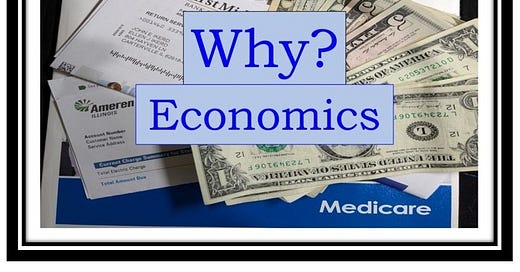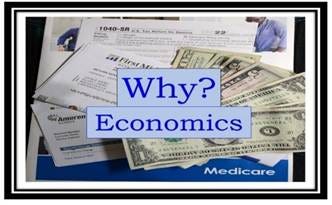Why not pay off the national debt?
Why should we, or shouldn’t we, be concerned about the national debt?
If the U.S. Congress is concerned about the national debt, why doesn’t it pay it off? The U.S. Constitution gives Congress the authority “to coin money and regulate the value thereof,” (Article I, Section 8).[ii] The Supreme Court has ruled that Congress has the power “to regulate every aspect of United States currency.”[i] Congress relegated its responsibility to regulate to value of money to the Federal Reserve System or FED. However, Congress can still authorize the federal government to create money for any public purpose, including to pay off the national debt.
However, creating enough money to pay off the national debt would put over $28 trillion more U.S. dollars in circulation in the private economy. Those who have loaned money to the government by buying U.S. Securities would have $28 trillion more to spend or invest elsewhere. That’s nearly as much as the yearly GDP, or the total value of production by the U.S. economy. This much new money in circulation could cause runaway price inflation and risk a global economic crisis.
To maintain the value of the U.S. dollar, the FED would need to remove enough from circulation in the private economy to offset increases in the money supply caused by paying off the national debt. This also would risk a major economic disruption. Of course, Congress could also raise taxes to pay off the national debt. However, neither option is necessary. There is no compelling reason to pay off the national debt.
Contrary to popular belief, the national debt is not like household or consumer debt. There is no mortgage or lien against the U.S. Capital, the Grand Canyon, or other government property. Lenders can’t claim a share of tax collections for repayment. Loans to the government are backed only by the “full faith and credit” of the United States—nothing more. Congress has directed the government to borrow rather than create money whenever it has authorized spending more than it was willing to assess in taxes. The government hasn’t purchased anything that couldn’t have been paid for by creating rather than borrowing money.
Whenever the government borrows and spends money, someone receives it, and either spends, invests, or deposits it in a commercial bank. This is how deficit spending puts new money in circulation. Some of this money goes back to the lenders as interest on government securities. The national debt is simply a historical record of the net amount of money put in circulation by government spending that was offset by government borrowing—through the sale of government securities.
The national debt is only debt in the same sense that deposits in commercial banks are debt. Foreign governments, state governments, mutual funds, pension funds, and individual investors own government securities, meaning they have deposits with the federal government. Investors deposit money with the U.S. government for the same reasons people deposit money in commercial banks. Government securities are a safe investment, they pay interest, and for foreign governments, are a convenient means of acquiring U.S. Dollars to use in international trade. The FED also affects the national debt by buying and selling government securities to manage the money supply.
There is no more reason to pay off the national debt for a commercial bank to close out its deposits and return the money to depositors. In addition, paying off the national debt without an offsetting increase in taxes would disrupt the money supply and destabilize the economy. There may be good reasons for Congress to raise taxes more than enough to offset increases in government spending, but paying off the national debt is not one of them.
For those who want to dig deeper into how government borrowing and spending affects the money supply, I recommend The Deficit Myth, by Stephanie Kelton. She is a professor of economics and public policy at Stony Brook University. She is a leading expert on Modern Monetary Theory and a former Chief Economist on the U.S. Senate Budget Committee. Kelton explains the common myths or fallacies that the government’s budget is like a household budget and that government spending that exceeds tax collections is irresponsible. She points out that government “deficits” always create private-sector “surpluses” that stimulate new private-sector spending and investments, which increase future government tax revenues. With fiscally responsible tax policies, future tax revenues would offset current budget deficits.
Kelton also explains why Americans shouldn’t be concerned about government deficits, as long as inflation in consumer prices remains under control. Deficit government spending results in consumer price inflation only if increases in production of the things consumers buy fail to keep pace with the increases in new money available to spend. This typically means the economy is approaching or has reached its maximum productive capacity. During the COVID pandemic, inflation resulted from supply-chain disruption of production.
In an earlier post, which I called “The Debt Deception,"[vii] I explained why I believed the focus on government budget deficits and the national debt is a carefully orchestrated political strategy to gain public support for reducing the size of the federal government. The strategy is guided by a quotation from President Ronald Reagan’s first inaugural address: "Government is not the solution to our problem, government is the problem." As conservative political strategist Grover Norquist put it: “I don't want to abolish government. I simply want to reduce it to the size where I can drag it into the bathroom and drown it in the bathtub.”[viii]
Public polling confirms that most Americans have been misled to believe that if we don’t balance the federal budget their grandchildren will be forced to repay the national debt.[ix] Even economists in the Congressional Budget Office recently warned that further increases in the national debt are “unsustainable.”[x] The only reason to be concerned about the national debt is if Congress refuses to allow the government to borrow money to meet its financial obligations, causing lenders to lose confidence in the “faith and credit of the U.S. government.” The U.S. monetary system is complex. Most people haven’t had an opportunity to learn about or understand how it functions or is supposed to function. The economists who advise our elected representatives have no such excuses.
The only logical conclusion seems that the “deficit myth” and “debt deception” are strategic attempts to gain public and Congressional support to reduce the size of the federal government. The majority of Americans don’t want cuts in the social programs that would need to be cut to significantly reduce budget deficits, such as Social Security, Medicare, education, unemployment insurance, or veterans’ benefits. Congress has been unwilling to fully fund these programs by raising taxes for those who have benefitted most economically from civil society and could easily afford to pay more to support it, including taxes on wealth and financial market transactions. Deficit spending is a congressional choice, not a necessity.
The current administration claims it is acting on a public mandate to cut taxes and to reduce the size of government, regardless of the consequences for government programs. We will have to wait and see whether the political strategy to make the government small enough “to drag it into the bathroom and drown it in the bathtub” has worked.
The choice between putting money into circulation through government spending and private-sector lending is simply a matter of political priorities. After the first round of spending, there is no difference. Additional lending and spending of new money take place in the private sector. The question is simply whether to allow the government to spend enough money to meet its constitutional responsibilities to serve the common interest of the people or instead to keep the government too small and weak to restrain the pursuit of individual economic self-interests in defense of the common good.
Congress, not the President, has the constitutional responsibility to manage the fiscal or monetary aspects of government. The government needs enough money to fulfill its constitutional responsibilities, “to establish justice, ensure domestic tranquility, provide for the common defense, and promote the general welfare”—as is spelled out in the Preamble to the U.S. Constitution.
These responsibilities were given to the government by the people because they are essential for the security and well-being of the nation and because individual economic incentives are either absent or inadequate to ensure their fulfillment. The private and public sectors are both critical to the health and well-being of the economy and society. Congress has the responsibility and the ability to maintain an appropriate balance between the two—but seems to lack the courage to do so.
John Ikerd
Notes:
[i] https://constitution.congress.gov/browse/essay/artI-S8-C5-1/ALDE_00001066/
[ii] https://www.jec.senate.gov/public/_cache/files/4fe8ff21-78d7-4354-abdb-0f953f891cb7/the-importance-of-the-federal-reserve---march-1997.pdf#:~:text
[iii] https://www.investopedia.com/terms/f/1913-federal-reserve-act.asp#:~:text .
[iv] https://www.investopedia.com/articles/investing/100715/breaking-down-federal-reserves-dual-mandate.asp
[v] fractional reserve banking
[vi] https://www.reuters.com/article/economy/ten-years-on-feds-long-strange-trip-to-zero-redefined-central-banking-idUSKBN1OF0GR/
[vii] https://www.johnikerd.com/government-policies-politics/the-national-debt-deception
[viii] https://en.wikiquote.org/wiki/Grover_Norquist
[ix] https://www.crfb.org/blogs/new-poll-finds-americans-worry-about-debt-and-want-budget-more-balanced-between-generations
[x] https://www.pgpf.org/article/cbos-new-report-shows-worsening-fiscal-outlook/





